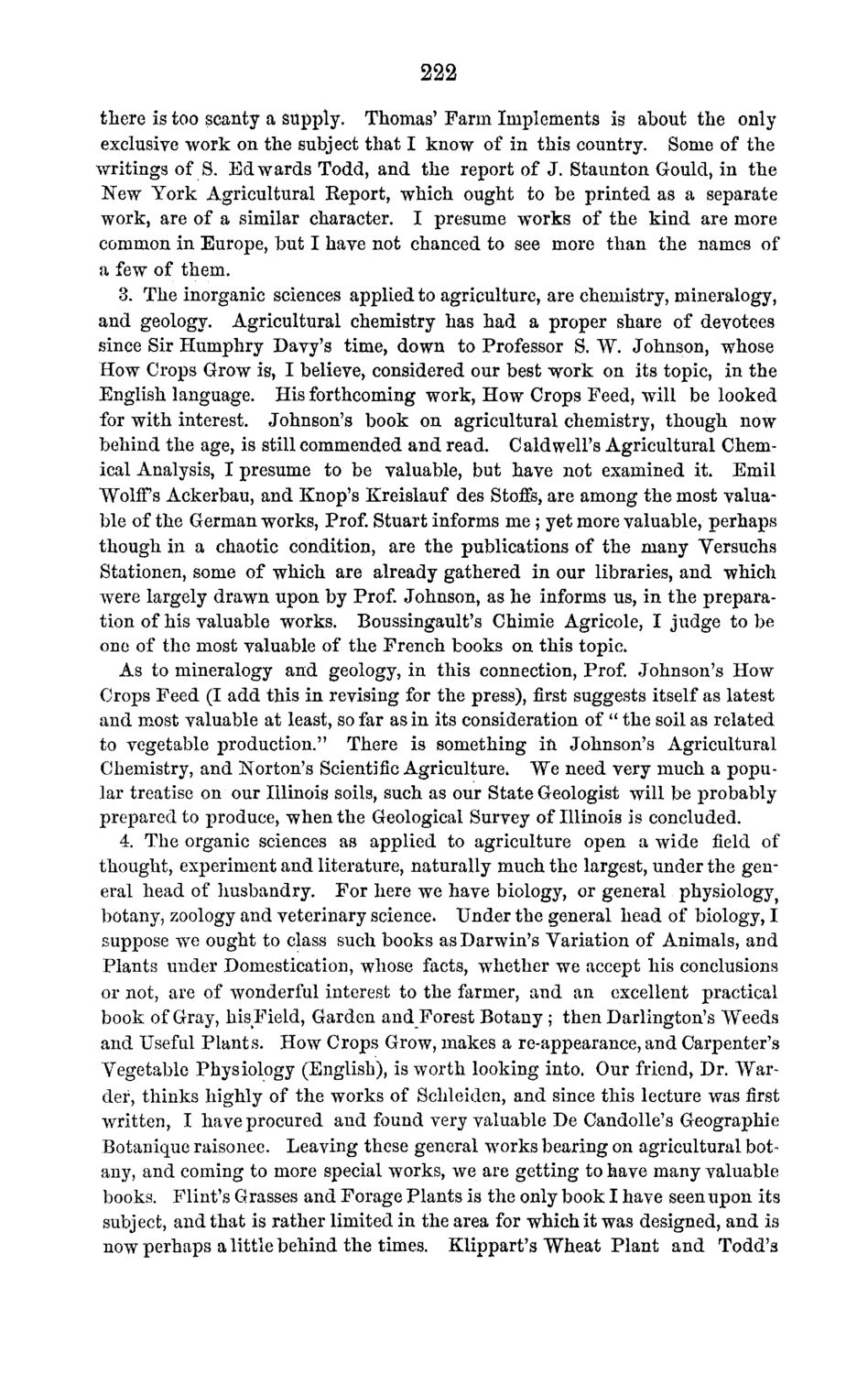| |
| |
Caption: Board of Trustees Minutes - 1870
This is a reduced-resolution page image for fast online browsing.

EXTRACTED TEXT FROM PAGE:
222 there is too scanty a supply. Thomas' Farm Implements is about the only exclusive work on the subject that I know of in this country. Some of the writings of S. Edwards Todd, and the report of J. Staunton Gould, in the New York Agricultural Report, which ought to be printed as a separate work, are of a similar character. I presume works of the kind are more common in Europe, but I have not chanced to see more than the names of a few of them. 3. The inorganic sciences applied to agriculture, are chemistry, mineralogy, and geology. Agricultural chemistry has had a proper share of devotees since Sir Humphry Davy's time, down to Professor S. W. Johnson, whose How Crops Grow is, I believe, considered our best work on its topic, in the English language. His forthcoming work, How Crops Feed, will be looked for with interest. Johnson's book on agricultural chemistry, though now behind the age, is still commended and read. Caldwell's Agricultural Chemical Analysis, I presume to be valuable, but have not examined it. Emil Wolff's Ackerbau, and Knop's Kreislauf des Stoffs, are among the most valuable of the German works, Prof. Stuart informs me ; yet more valuable, perhaps though in a chaotic condition, are the publications of the many Versuchs Stationen, some of which are already gathered in our libraries, and which were largely drawn upon by Prof. Johnson, as he informs us, in the preparation of his valuable works. Boussingault's Chimie Agricole, I judge to be one of the most valuable of the French books on this topic. As to mineralogy and geology, in this connection, Prof. Johnson's How Crops Feed (I add this in revising for the press), first suggests itself as latest and most valuable at least, so far as in its consideration of " the soil as related to vegetable production." There is something in Johnson's Agricultural Chemistry, and Norton's Scientific Agriculture. We need very much a popular treatise on our Illinois soils, such as our State Geologist will be probably prepared to produce, when the Geological Survey of Illinois is concluded. 4. The organic sciences as applied to agriculture open a wide field of thought, experiment and literature, naturally much the largest, under the general head of husbandry. For here we have biology, or general physiology? botany, zoology and veterinary science. Under the general head of biology, I suppose we ought to class such books as Darwin's Variation of Animals, and Plants under Domestication, whose facts, whether we accept his conclusions or not, are of wonderful interest to the farmer, and an excellent practical book of Gray, hisField, Garden and Forest Botany; then Darlington's Weeds and Useful Plants. How Crops Grow, makes a re-appearance, and Carpenter's Vegetable Physiology (English), is worth looking into. Our friend, Dr. Warder, thinks highly of the works of Schleiden, and since this lecture was first written, I have procured and found very valuable De Candolle's Geographie Botanique raisonee. Leaving these general works bearing on agricultural botany, and coming to more special works, we are getting to have many valuable books. Flint's Grasses and Forage Plants is the only book I have seen upon its subject, and that is rather limited in the area for which it was designed, and is now perhaps a little behind the times. Klippart's Wheat Plant and Todd's
| |